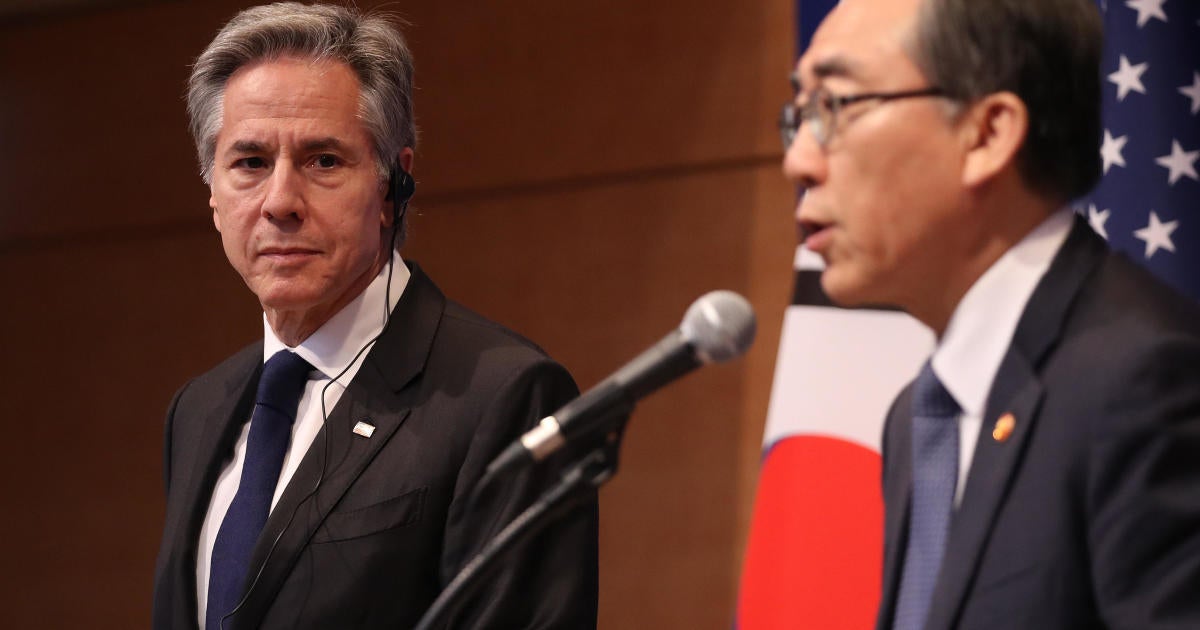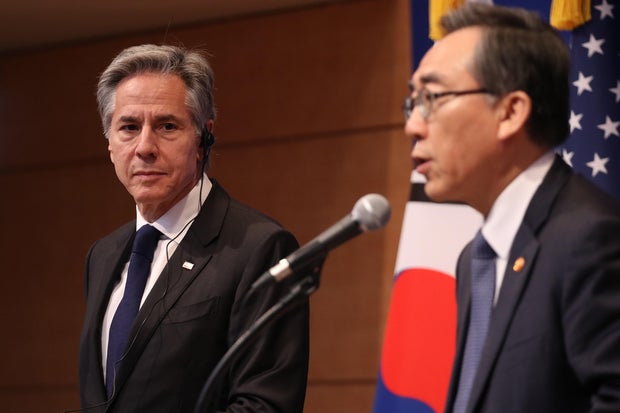Seoul — North Korea on Monday test fired a ballistic missile as U.S. Secretary of State Antony Blinken visited South Korea, where he warned that Pyongyang was working ever closer with Russia on advanced space technology. Blinken also said that while he believed a ceasefire between Israel and Hamas would end the war in Gaza, it may not happen until after President Biden’s term, under returning President-elect Donald Trump.
Blinken visited Seoul as investigators were trying to arrest conservative President Yoon Suk Yeol, who has entrenched himself in his residence after being impeached for a failed attempt to impose martial law, but he declined to wade into the domestic political turmoil that has gripped the close U.S. ally.
In a reminder of common challenges that go beyond the South’s politics, North Korea on Monday fired a ballistic missile to sea as Blinken held meetings in Seoul, pushing him to rebuke Pyongyang and its ally Russia.
Chung Sung-Jun/Getty
Both Blinken and his South Korean counterpart Cho Tae-yul condemned the launch at a joint press conference, with Washington’s top diplomat calling it “another violation of multiple U.N. Security Council resolutions.”
Blinken says Russia could give North “advanced” space tech
The outgoing diplomat also took aim at Russia, saying Moscow was expanding space cooperation with Pyongyang.
“The DPRK is already receiving Russian military equipment and training. Now we have reason to believe that Moscow intends to share advanced space and satellite technology with Pyongyang,” he told the news conference.
His warning echoed concerns first voiced by officials more than a year ago, before North Korea started provided weapons and, later, even troops, to help Vladimir Putin’s ongoing war effort in Ukraine.
Since then, the U.S. and South Korea say Kim Jong Un has sent at least 10,000 North Korean soldiers to help shore up Putin’s forces, who have been stretched thin after almost three years of intense fighting in eastern Ukraine and, more recently, in Russia’s border region of Kursk, which Ukrainian forces invaded late last year.
After North Korea’s missile flew around 680 miles before falling into the sea on Monday, Seoul said it had “strengthened surveillance and vigilance” for more launches. Seoul was also “in close coordination with the U.S. and Japan” about the launch, the South’s military added.
U.S., South Korea stress ties amid changing leadership
The test comes two weeks before the inauguration of President-elect Donald Trump, who in his last term sought to woo North Korea with a unique brand of personal diplomacy.
Blinken reiterated the “ironclad commitment” of Washington to defending South Korea and spoke with Deputy Prime Minister and acting President Choi Sang-mok about “how both sides will work together to further strengthen bilateral cooperation and trilateral cooperation with Japan,” a State Department statement said.
Until briefly imposing martial law on December 3, Yoon had been a darling of President Joe Biden’s administration for his pro-U.S. policies on the global stage. He delighted the United States by seeking to turn the page on decades of friction with Japan, a fellow U.S. ally that is also home to thousands of U.S. troops.
Yoon joined Biden and Japan’s then prime minister Fumio Kishida in 2023 for a landmark three-way summit at the Camp David presidential retreat that included a promise to step up intelligence cooperation on North Korea. Choi’s office said in a statement that South Korea remained committed to the “principles and agreements from the Camp David summit.”
The acting president “stated that South Korea will continue to maintain its diplomatic and security policies based on a strong Korea-U.S. alliance and trilateral cooperation among South Korea, the U.S. and Japan.”
South Korea’s progressive opposition, which has made Yoon’s life miserable from parliament and is increasingly ascendant since the president’s power grab, historically has taken a harder line on Japan.
Opposition leader Lee Jae-myung — who himself faces election disqualification in a court case — also favors more diplomatic outreach with North Korea than the hawkish Yoon.
The turmoil and lack of a clear leader in Asia’s fourth-largest economy comes just as the U.S. is in the midst of its own political transition.
While Mr. Biden has focused on nurturing U.S. alliances, Trump, who takes over on January 20, has been dismissive of what he sees as unfair commitments by Washington. Trump said during his latest presidential run that if he were in power he would have strong-armed South Korea into paying $10 billion a year for the U.S. troop presence, nearly 10 times what it contributes now.
But paradoxically, Trump forged a bond with the last progressive South Korean president, Moon Jae-in, who encouraged his attempts at deal-making with North Korea.
Trump, who once threatened “fire and fury” against North Korea, went on to meet three times with leader Kim Jong Un and said they “fell in love.”
Blinken says Israel-Hamas truce may not happen under Biden
Blinken voiced confidence Monday that a ceasefire deal in Gaza would come together, but possibly after President Joe Biden leaves office on January 20. Blinken, who tried repeatedly and unsuccessfully last year to broker a ceasefire between Hamas and Israel, said the Biden administration would “work every minute of every day” until the end of its term to secure a hostage release deal.
“We very much want to bring this over the finish line in the next two weeks,” Blinken told reporters in Seoul. “If we don’t get it across the finish line in the next two weeks, I’m confident that it will get its completion at some point, hopefully sooner rather than later. When it does, it will be on the basis of the plan that President Biden put forward and that virtually the entire world supports.”
Trump has vowed even stronger support for Israel and has warned Hamas of “hell to pay” if it does not free the roughly 100 hostages still believed to be held in Gaza more than a year after Hamas’ Oct. 7, 2023 terrorist attack. Israeli officials believe about two thirds of the remaining hostages are still alive.
A Hamas official said Sunday that the group was ready to free 34 hostages in the “first phase” of a potential deal with Israel, which said that indirect talks had resumed in Qatar.
Blinken said there had been an “intensified engagement” by Hamas on reaching a deal, but that it was not yet complete.
“We need Hamas to make the final necessary decisions to complete the agreement and to fundamentally change the circumstance for the hostages, getting them out, for people in Gaza, bringing them relief, and for the region as a whole, creating an opportunity to actually move forward to something better,” Blinken said.
Blinken has made 12 visits to the Middle East since the massive Oct. 7 attack by Hamas on southern Israel, which saw the group kill some 1,200 people and take 251 others captive.
Prime Minister Benjamin Netanyahu responded by immediately launching a relentless military campaign in Gaza, which health officials in the Hamas-run Palestinian territory say has killed more than 45,000 people, decimated all of the enclave’s infrastructure and forced virtually all of its residents from their homes.
Grub5



